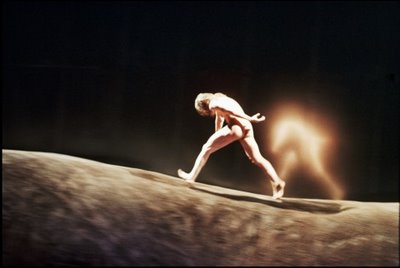 Em Abril passado o site de crítica belga Sarma foi convidado a organizar um conjunto de encontros sobre crítica, no âmbito do Tanzkongress, que decorreu em Berlim, e sobre o qual falei aqui. Os encontros, genericamente intitulados Unfolding the critical, reuniram vários nomes que reflectiram sobre os limites de aplicação do discurso crítico, a sua relação com a criação ou o modo como o discurso era influenciado por outras disciplinas.
Em Abril passado o site de crítica belga Sarma foi convidado a organizar um conjunto de encontros sobre crítica, no âmbito do Tanzkongress, que decorreu em Berlim, e sobre o qual falei aqui. Os encontros, genericamente intitulados Unfolding the critical, reuniram vários nomes que reflectiram sobre os limites de aplicação do discurso crítico, a sua relação com a criação ou o modo como o discurso era influenciado por outras disciplinas. Um dos nomes presentes foi o de Irit Rogoff, professora de Visual Arts no Goldsmiths College, em Inglaterra, e autora de diversos artigos sobre colonialismo, performatividade e diferenças culturais. Na comunicação que fez ao congresso, Irit Rogoff utilizou um termo - criticalidade, (à falta de melhor palavra, segundo a autora), e se pode definir como um conceito no qual o sujeito (espectáculo, intérprete, observador) habita a crítica, é a crítica.
Vem isto a propósito do Sarma já ter online as comunicações em ficheiros áudio. Para ouvir aqui, em streaming audio (é necessário ter o QuickTime Player instalado).
Ler, a seguir, uma breve nota e comentário, de minha autoria, sobre o termo. O excerto fará parte de um texto a publicar brevemente.
"Within the space of a relatively short period we have been able to move from criticism to critique to criticality - from finding fault, to examine the underlying assumptions that might allow something to appear as a convincing logic, to operating from an uncertain ground which, while building on critique, wants nevertheless to inhabit culture in a relation other than one of critical analysis."
Irit Rogoff
Notes:
Criticality is a term developed by the art historicist Irit Rogoff (Goldsmith’s College) that considers that “the subject inhabits the critical”. She explained it is a “form of embodiment” that relates no the notion of “without”. What does this mean?
Rogoff’s term (that she considers as a mutant term – aka still in development and dependent of that development in order to exist and sustain itself) says that we don’t learn something new without learning something old, or without really understanding something old. Because we are always accumulating information we tend to forget or diminish the structure. So, if we keep being confronted with new forms of speech how can we follow them up?
For Rogoff we have to be “fully armed with the knowledge [and aware of the power] of critic [and criticism]”. If we are sharing the same conditions and environment as the artists we have to start thinking on how to come out of the objects and start producing theory that doesn’t only reflect those objects.
“We fellow sufferers“, she says, quoting Hanna Arendt. Rogoff believes in the paradox: how do we act when we cannot articulate the subjects and how can we see that if in that incapacity may reside the ability to move forward? It is not by inventing a new speech that will legitimate the artistic object that we embody the object. It’s by doing the exact opposite. Criticism has to be a process and the text that we produce has to be the starting point, not the final goal. This implies shifting our point of view from the “answerer” to the “searcher”. It is only by “sharing and learning that we’re able to see through”, she says.
Criticality then has to do with incontemporanity and not with interdisciplinary. How do we intervene not to change but to take part of the change? We all know that nowadays there are a lot of genres and movements and guidance lines that combine themselves momentaniously transforming the notions we have. That is not a handicap is part of the diversity of things. So, contemporanity is not the mere existence of these changing (that, to be completely honest, always existed) but what we think and what we want with it. Interdisciplinary is, obviously, rhetorical. Contemporanity is a conjunction of things. How do we transform this conjunction in something valid? That’s criticality. A narrow relation between “subject and constitution of objects”.
This gives to the critic, but also to the artist, the object and the surrounding a different perspective on the importance of their roles. We do not have to feel excluded if we understand that the tension between deconstruction and performativity can be surpassed by a theorization of the act of living. The deterritorialization of the knowledge (meaning a need to not circumscribe criticism in the critics, objects in the creators) is the “drive” to achieve criticality. Obviously Irit Rogoff is aware that it will be easier for us critics to do this walk. Easier for us than for artists or public. So to us it is a question of pounding our role? How much are we able to sustain? How far are we able to go for an object?
na foto: FORGERIES, LOVE AND OTHER MATTERS Meg Stuart/Benoît Lachambre/Hahn Rowe Photo: Chris Van Der Burght






Sem comentários:
Enviar um comentário